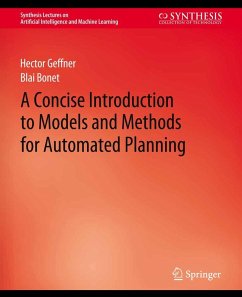Planning is the model-based approach to autonomous behavior where the agent behavior is derived automatically from a model of the actions, sensors, and goals. The main challenges in planning are computational as all models, whether featuring uncertainty and feedback or not, are intractable in the worst case when represented in compact form. In this book, we look at a variety of models used in AI planning, and at the methods that have been developed for solving them. The goal is to provide a modern and coherent view of planning that is precise, concise, and mostly self-contained, without being shallow. For this, we make no attempt at covering the whole variety of planning approaches, ideas, and applications, and focus on the essentials. The target audience of the book are students and researchers interested in autonomous behavior and planning from an AI, engineering, or cognitive science perspective. Table of Contents: Preface / Planning and Autonomous Behavior / Classical Planning: Full Information and Deterministic Actions / Classical Planning: Variations and Extensions / Beyond Classical Planning: Transformations / Planning with Sensing: Logical Models / MDP Planning: Stochastic Actions and Full Feedback / POMDP Planning: Stochastic Actions and Partial Feedback / Discussion / Bibliography / Author's Biography
Dieser Download kann aus rechtlichen Gründen nur mit Rechnungsadresse in A, B, BG, CY, CZ, D, DK, EW, E, FIN, F, GR, HR, H, IRL, I, LT, L, LR, M, NL, PL, P, R, S, SLO, SK ausgeliefert werden.


